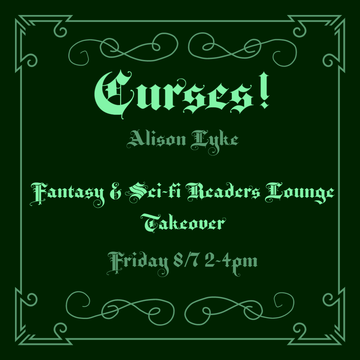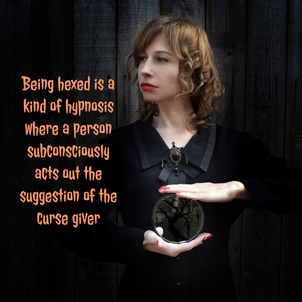|
I wrote this post as a part of my upcoming Fantasy and Science Fiction Reader’s Lounge Takeover. Can someone curse you without your knowledge? Literary convention argues that you cannot. In Terry Pratchett’s Equal Rights, master witch Granny Weatherwax subscribes to “Headology.” According to her, if you give the evil eye to someone, they’ll blame their next bit of bad luck on your curse. Soon enough, you’re the reason for their misery, and it didn’t take a trace of magic. Curses are made of three components: the curse giver, the person being cursed, and the belief in such a thing as curses. In this way, being hexed is a kind of hypnosis where a person subconsciously acts out the suggestion of the curse giver. Is this how it works in life? Maybe. You might walk under a ladder and then spill your coffee. Common sense dictates the two events are unconnected. If you believe dropping your coffee results from walking under a ladder, you’re committing a logical fallacy called post hoc ergo propter hoc. Or maybe the ladder cursed you. Who am I to say? Some magical curses in literature are not a result of Headology, though. Highly magical curses like that of the beast in Beauty and the Beast or the Unforgivable Curses in Harry Potter are so forceful they don’t require a shared belief in jinxes. In fact, fairytales are full of hexes with complex unraveling involving true love and kisses. No, you cannot be unaware of a curse. Either your belief that someone cursed you is perpetuating your hardship, or the affliction is of a highly magical, unmistakable nature. So, go home, open your umbrella, snuggle your black cat, and ignore all those chain letters. Come back next week for the final post in my Writing Alignment Series.
3 Comments
Danielle McDonald
8/7/2020 10:39:27 am
Sounds like a good read
Reply
bn100
8/14/2020 12:36:40 am
looks interesting
Reply
NANCY
8/16/2020 03:25:17 pm
Sounds intriguing
Reply
Leave a Reply. |
Alison Lyke
Categories
All
Archives
November 2022
|



 RSS Feed
RSS Feed
